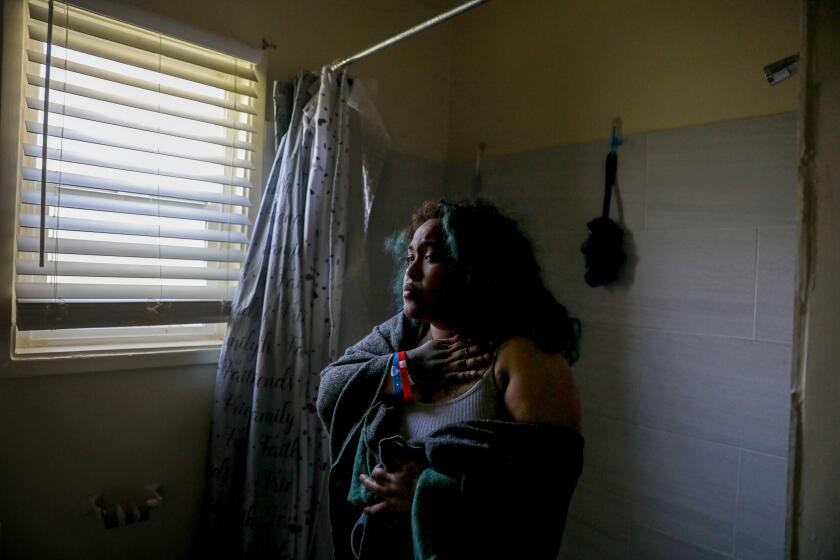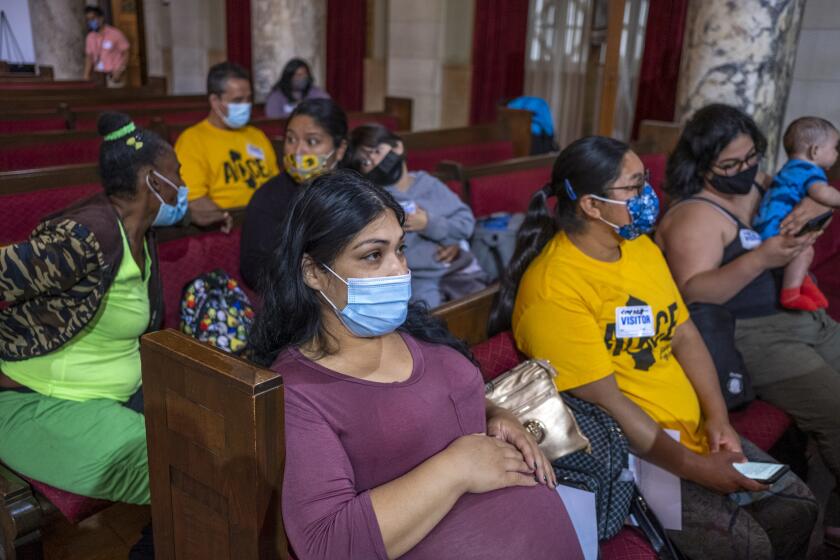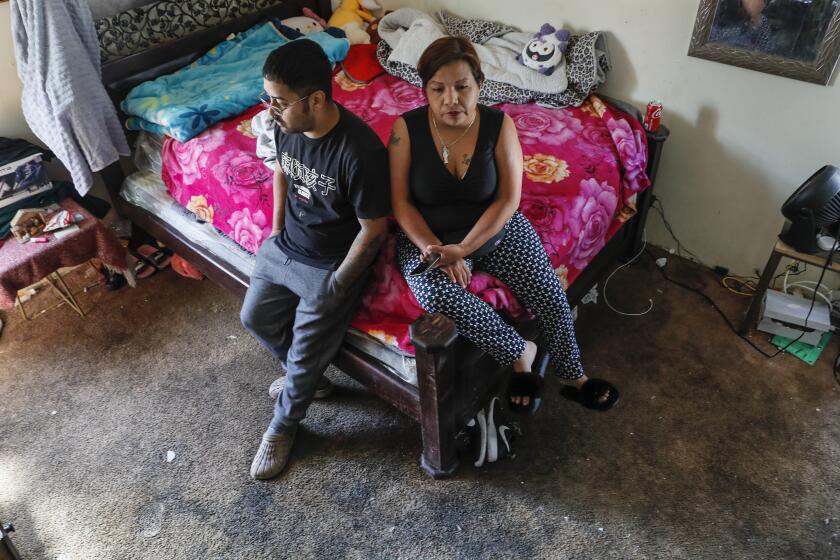‘We basically sleep with the roaches.’ Tenants sue at large South L.A. apartment complex

- Share via
Nearly 100 residents of a large, troubled apartment complex in South Los Angeles have sued their landlord in recent months, alleging rampant vermin infestations, faulty plumbing, deficient electricity and heating and other significant habitability problems.
The claims made across three Los Angeles County Superior Court lawsuits filed since December reflect deep frustrations from tenants at Chesapeake Apartments against their landlord, Pama Properties. Although residents have long complained about the World War II-era, 425-unit complex, the issues came into public view last spring when city code enforcement and public health officials found sewage being discharged on public grounds outside the apartments and squalid conditions inside.
“We’ve been living in these conditions for all these years,” Diana Dean, 35, said on the steps of the Stanley Mosk Courthouse downtown before one of the lawsuits was filed last month. “We’re tired of it.”
Dean has lived in a one-bedroom apartment with her husband and five children since 2019. She said her family has made numerous complaints, but property managers have not fixed problems with electricity and vermin.
“We basically sleep with the roaches,” said Dean, who pays $1,678 a month in rent.
Dean and the other tenants are seeking damages and civil penalties against Pama and related entities.
Michael Goldberg, a spokesperson for Pama, said in a statement to The Times that the landlord works to ensure the health, safety and welfare of its residents.
“While it is unfortunate that these allegations were raised against us, we will continue to work tirelessly to address any and all reasonable requests made by tenants,” Goldberg said.
At the 425-unit Chesapeake Apartments in South Los Angeles, tenants complain that the city and their landlord have ignored problems for a long time.
The complex, which sits on 17 acres along Obama Boulevard and Rodeo Lane, has nearly two dozen two-story buildings constructed around courtyards and parking lots.
Over the last five years, county public health inspectors had found an average of more than three violations per month at Chesapeake Apartments, the most of any residential property in L.A. County during that time, a May 2022 Times analysis determined. Companies linked to Pama Properties President Mike Nijjar own more than $1 billion in real estate, predominantly in Southern California. Many of the properties have had serious health and livability problems, according to a 2020 investigation by LAist.
Last year, 16 Chesapeake Apartments tenants agreed to resolve a habitability lawsuit filed in 2020 against Pama Properties. The tenants together received a $520,000 settlement, according to court records.
City and county inspectors plan to examine all 425 units in Chesapeake Apartments next month. But records show agencies have missed obvious warning signs about the property’s extensive deterioration over decades.
Christofer Chapman was an attorney for those tenants, and now he represents 42 more in a case filed in December. He said the landlord ignores its obligations to tenants.
“They’re such a large outfit and they really don’t care,” Chapman said. “These are owners that just operate this way.”
Goldberg, the Pama spokesperson, said the landlord provides needed housing for low-income residents that prevents gentrification and homelessness.
“We will not deviate from our mission of serving the unheard and underserved,” he said.
Tenants at one of L.A.’s largest apartment complexes continue to live in unsafe conditions months after the city, county and landlord pledged action.
In 2017, then-City Atty. Mike Feuer sued Pama Properties and Nijjar over crime problems, reaching a settlement that required safety and habitability upgrades.
Early last year, city code enforcement officials completed an assessment of Chesapeake Apartments that’s required every two years and gave it a clean bill of health. But following an April 2022 Times story that revealed serious ongoing health and livability concerns at the complex, city code and county public health officials underwent new inspections at the Chesapeake, ultimately identifying more than 2,000 violations.
The Times’ Liam Dillon and CalMatters housing reporter Manuela Tobias chat about the latest developments in California housing policy and interview key newsmakers and other reporters. Available on Apple, SoundCloud, Spotify, Google and Stitcher podcasts.
In the fall, the agencies cleared the lion’s share of those violations. They committed to continuing to inspect all units at the property, including those where they needed to secure warrants to enter.
Tenants have complained about shoddy repairs after the city and county investigations, such as the landlord installing new hinges on rotting wood cabinets and vinyl over floorboards that sag underfoot.
More to Read
Sign up for Essential California
The most important California stories and recommendations in your inbox every morning.
You may occasionally receive promotional content from the Los Angeles Times.











